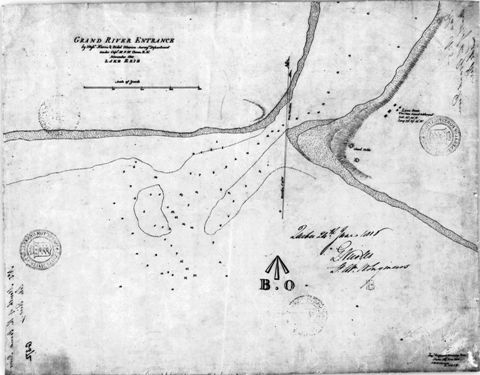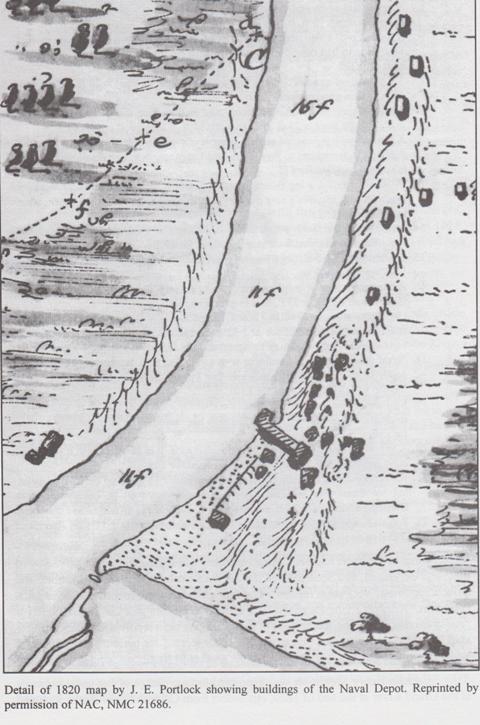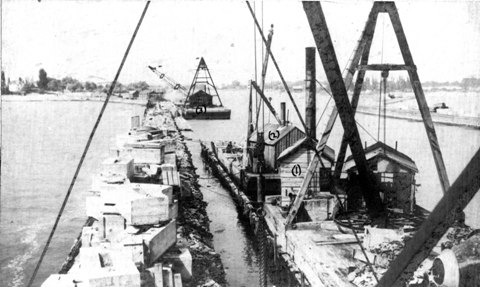Patience my friends!
Shortly before my good friend Earl Siddall died I noticed sitting
on a desk in his den a photo-copy of a great photograph. As I
almost always did, I said I would love to have a copy of that
someday. “Patience my friend!” It must have been obvious I was
turning inside out just jumping to get a hold of it! Earl had a
way of knowing those things and loved to taunt you if he thought
he could string you along.
A few short months later and
he was gone, and in the confusion that follows, so was that
picture. Then in the winter of 2002 I received a phone call from
one of my “thousands of readers” telling me he knew of
some great pictures (and where they could be located) of the 1909
reconstruction of the west Port Maitland pier. That is what the
subject was in Earl’s photo. To make a very long and complicated
story considerably shorter, I was at the Dunnville District
Heritage Association display in February 2003 showing a number of
Stromness school photos and met June High, formerly June Pyle of
Stromness. One thing led to another and she offered me some great
Stromness photos. That led to a visit to her home and a discussion
about Port Maitland photos. It seems she was the owner of the
aforementioned 1909 Port Maitland photos. She thoughtfully, loaded
them to me and I will share a couple with you during this three
part article.
You might remember this time period was
during the lead up to the 2002 reconstruction of the West Pier and
removal and placement of the new break wall for the East Pier.
I
believe there still remains the question as to when the first pier
was constructed at the mouth of the Grand River. It is hard to
imagine it would have been later than 1842 when the Feeder Canal
was opened to the river. There are indications that one pier may
have been much earlier. As early as 1816 according to John
Docker’s book the, Grand River Naval Depot, we can find
reference to a pier at Port Maitland. The question is the meaning
of the word pier! John tells that the ships Tecumseth and
Newash were grounded on the sandbar at the mouth of the
river in 1816. They were then replaced with the ships Confiance
and Surprize. Captain William Bourchier of the Confiance
as well as the Naval Depot is reported to have been prepared at
all times to defend our borders, while erecting building and
constructing piers. Here the question is; was the use of the word
pier meant to mean pier(s) as we think of them or was it meant to
imply docks? Grand River Naval Depot was published in 2000.
Copies are still available from the Dunnville District Heritage
Association
A few years after the closing of the war of
1812, John Howison, visits the Naval Reserve and mades some
recommendations. John Howison, wrote a book titled Sketches of
Upper Canada, published in Edinburgh in 1821. One of the
recommendations is . . ., “The mouth of this river must form a
post of some importance when we are at war with the United States
and might be rendered far more effective than it is at present,
were government to strengthen it by raising piers and
fortifications: and this seems very necessary, for the Americans
must always derive a vast naval superiority on Lake Erie, from the
many excellent harbours which abounds in its southern shores.”
This statement would imply that there were no piers present during
his post 1812 visit.
Again from John Docker’s book,
Lieutenant Colonel Dunford offered a solution to the problem of
the annual sand bar at the mouth of the river. “As I was made
acquainted with the great importance of rendering the entrance
into this river available for the naval department, I thought it
my duty to see the nature of it. . . . A natural bank extends
along the shore and side of the river fronting the establishment
covering a deep swamp, the surface of which is nearly on a level
with that water.
I therefore conceive that a
canal of communication may be cut in a perpendicular direction to
the river and running within and parallel to the natural banks
until it arrives in a suitable part of the Bay for construction of
two pier heads at sufficient distance apart to admit the
vessels.
By this plan I expect that no portion
of the sediment or sand that forms the shifting bar now preventing
the access to the river will ever lodge in the canal.
The
current of the river will not be interfered in the least and the
pier heads can be situated at such a distance from the bar as not
to operate on the causes that produce that barrier.
The
expenses of this undertaking would not, I think be very
considerable, but without further investigations, I cannot take
upon myself to state it with any degree of accuracy as lumber is
on the spot, workmanship would be the greatest expense.”
Next
month we will learn more from John Docker’s writings but with
those writing I will add to the confusion more as I attempt to pin
down when and where the many piers were built at Port Maitland.
|

1818 before any piers were built


1909 West Pier reconstruction
|

